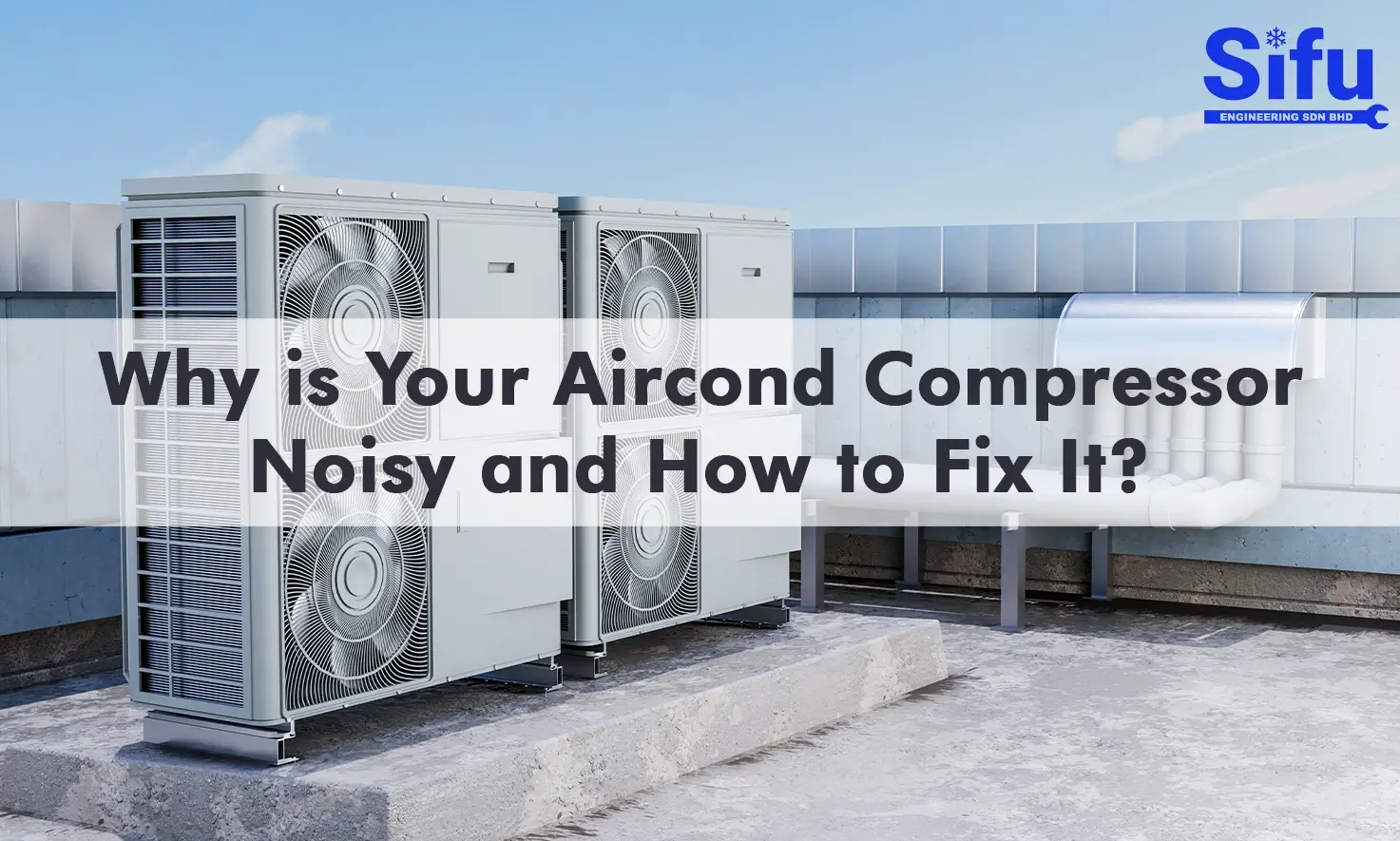Is the loud “BRRRRRR”, “GRINDING”, or constant “BUZZING” from your outdoor air cond compressor driving you up the wall? You’re not alone. In Malaysia’s relentless tropical heat, our air conditioning units work overtime, and a noisy compressor is one of the most common and annoying household problems.
A noisy compressor isn’t just an irritation; it’s often a cry for help from your AC unit. Ignoring it can lead to a complete breakdown, a whopping electricity bill, and a costly replacement that could have been avoided.
This comprehensive guide is tailored for Malaysian homeowners and tenants. We’ll decode the different types of compressor noises, explain their common causes, show you what you can fix yourself, and most importantly, tell you when it’s time to call in a professional technician.
Understand the Heart of Your AC: The Compressor
Think of the compressor as the heart of your air conditioning system. Housed in the outdoor unit (the part with the big fan), its job is to pump refrigerant (gas) throughout the system, building up pressure and heat to kickstart the cooling process.
A healthy compressor should hum steadily and consistently. It’s not silent, but its sound should be a stable background noise. When this sound changes into something more alarming, it’s a sign that something is wrong.
🔊What Noises Are Normal and What’s Not?
Before jumping into causes and fixes, it’s important to know the difference between normal and problematic sounds.
- ✅ Normal sounds: a soft hum, gentle whoosh of air, or a low vibration during operation.
- ❌ Problematic sounds:
- Banging/clanking – loose or broken parts inside the compressor.
- Screeching/screaming – dangerous refrigerant pressure issues.
- Buzzing/humming – electrical faults or gas problems.
- Clicking/ticking – electrical start-up issues or debris stuck inside.
- Loud rattling – screws, brackets, or fan components have come loose.
👉 If the noise gets progressively louder or unusual, it’s time to act.
Common Causes of a Noisy Aircond Compressor

Loose or Worn Internal Parts
How does it sound?
Rattling, clanging, or metal-on-metal knocking when the compressor runs or shakes.
Why did it happen?
- Vibration over time loosens screws, bolts, or brackets.
- Outdoor units exposed to rain, wind, and humidity (common in Malaysia) wear out faster.
- Rust or corrosion on casing and mounts.
What to do:
Check if the panels, screws, and mounting brackets are tight. Replace broken parts or add rubber pads to absorb vibration.

Dirty Condenser Coils & Outdoor Unit
How does it sound?
Louder-than-usual humming or buzzing as the compressor strains.
Why did it happen?
- Malaysia’s dusty roads, construction areas, and humid climate encourage debris and mould buildup.
- Blocked coils trap heat, forcing the compressor to overwork.
What to do:
Clean coils regularly using a soft brush or coil cleaner. Schedule professional servicing twice a year to prevent clogging.

Refrigerant Issues (Low, Overcharged, or Leaking)
How does it sound?
Hissing, gurgling, or high-pitched whistling.
Why did it happen?
- Refrigerant leaks through cracked pipes or loose joints.
- Overcharged refrigerant increases system pressure.
- Moisture or dirt inside the lines causes turbulence.
What to do:
Refrigerant must be handled by licensed professionals. If you notice oil stains or reduced cooling with noise, call a certified aircond technician in Malaysia to inspect and refill properly.

Fan Blade or Motor Problems
How does it sound?
Whirring, rattling, or rhythmic clicking as the fan rotates.
Why did it happen?
- Fan blades bent or hitting casing.
- Objects (sticks, leaves, plastic) stuck in the outdoor fan.
- Motor bearings worn out.
What to do:
Turn off the power, remove debris, and check if the blades are bent. For motor or severe damage, call a technician.

Poor Installation or Mounting Issues
How does it sound?
Vibration noise transfers through walls, floors, or windows.
Why did it happen?
- Outdoor unit not leveled correctly.
- Weak mounting brackets or no vibration pads.
- Compressor vibrations echoing into the home structure.
What to do:
Ensure your outdoor unit is mounted on a stable, level surface with rubber vibration pads. If installed on walls, brackets should be sturdy and rust-resistant.

Weather & Environmental Effects
How does it sound?
Temporary rattles, hissing, or dripping noises, especially during heavy rain or storms.
Why did it happen?
- Heavy rain splashing into outdoor units.
- Water pooling inside causing vibrations.
- Strong winds blowing debris inside.
What to do:
Install a weather cover or awning above your outdoor unit, ensuring airflow is not blocked. Keep surroundings clear of vegetation and debris.

Aging Compressor Near End of Life
How does it sound?
A mix of humming, grinding, and rattling that gets worse over time.
Why did it happen?
- Seals, valves, and bearings wear out with years of operation.
- Efficiency drops, causing more strain and louder operation.
- Typically seen in compressors over 8–10 years old in Malaysia’s hot climate.
What to do:
At this stage, repairs are often more expensive than replacement. Replacing the compressor (or entire outdoor unit) is the most cost-effective solution.
How to Fix a Noisy Aircond Compressor: DIY vs. Professional Help
⚠️ SAFETY FIRST: Always TURN OFF THE POWER to the air conditioning unit at the circuit breaker before inspecting or touching the outdoor unit. ⚠️
DIY Fixes (Safe for Homeowners)

If the noise is rattling, these simple checks could solve the problem in minutes.
1. Turn Off the Power:
Go to your main DB box and switch off the circuit breaker for your air conditioner.
2. Inspect the Outdoor Unit:
Look for any obvious debris like leaves, twigs, or dried leaves stuck in or around the unit. Gently remove them.
3. Check for Loose Panels:
Gently shake the exterior panels of the outdoor unit. If they rattle, tighten the screws with a screwdriver.
4. Check the Fan Blades (Carefully!):
Look through the grille at the fan. If you can see obvious damage or something stuck in it, you might need to unscrew the top panel for better access (only if you are comfortable). Do not bend the fan blades.
5. Ensure the Unit is Level:
Place a small level on top of the unit. If it’s uneven, it can cause excess vibration. You can place a rubber pad underneath to stabilise it.
💡 What to use: A simple screwdriver, gloves, and a level.
When to Call a Professional

Some problems need a certified aircond technician:
- Gas Leak or Refill – requires specialized tools and refrigerant handling.
- Capacitor Replacement – involves electrical components (unsafe for DIY).
- Motor Bearing Issues – usually needs part replacement.
- PCB Board Problems – noise may come from faulty electronics.
- Non-Condensables in System – needs professional evacuation and recharge.
💡 Tip for Malaysians: Always hire a licensed service provider. Avoid cheap unqualified “pasang aircond” services, they may worsen the issue by mishandling refrigerant or wiring.
Conclusion
An air conditioner compressor that makes noise is a red flag. Early repair prevents expensive breakdowns and increased electricity costs, whether the problem is a loose screw, a clogged filter, or a major refrigerant problem.
For Malaysian homeowners, regular servicing is the key. Keep filters clean, schedule maintenance every 6 months, and always engage qualified technicians when the problem exceeds DIY fixes. Contact Sifu Engineering if you are looking for reliable and trustworthy air conditioning services.
With the right care, your aircond will stay cool, quiet, and energy-efficient, which is perfect for Malaysia’s tropical weather!
FAQ: Noisy Air Cond Compressor Malaysia
Can I just ignore the noise if the AC is still cooling?
It is highly not recommended. The noise is a symptom of a problem that will likely get worse, leading to more damage and a much higher repair bill down the road.
My compressor is very noisy when it rains. Why?
Water can get into electrical components or cause fan blades to hit collected water, creating a splashing or buzzing sound. Ensure your outdoor unit is properly shielded and that drainage is not blocked.
Is it worth repairing an old compressor, or should I just buy a new unit?
As a rule of thumb, if the repair cost is more than 50% of the price of a new unit, and your AC is over 8 years old, it’s often more cost-effective to replace it. New units are far more energy-efficient and will save you money on your Tenaga bill in the long run.
How long should a compressor last in Malaysia?
With proper regular maintenance, a good quality compressor should last between 10 to 15 years. Without maintenance, its lifespan can be cut in half.
Is it dangerous to continue operating a noisy compressor?
Yes, because what is now a small problem (e.g. worn bearing) may escalate to total failure, higher electricity bills, or even risk of fire/electrical damage. Better to address sooner rather than later.


